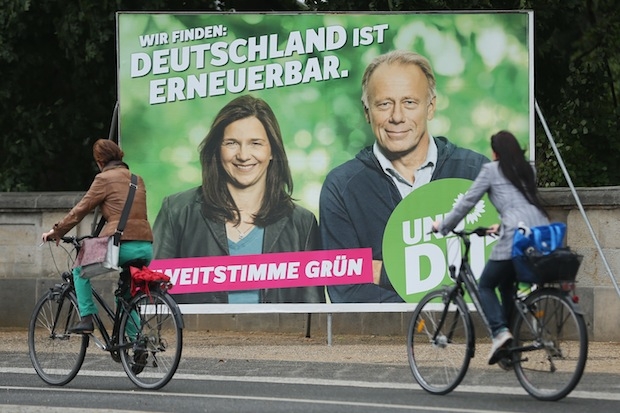The German Green Party is having a torrid time. In an election campaign remarkable for static polls, come what may, the collapse of a third of the Green vote has been the most pronounced swing to be found. If in Sunday’s vote they do as poorly as it now looks like they will, this makes it more likely, not less, that they will end up in government.
As it gradually became clear that Angela Merkel is staying put, and the real question was who she would end up with as coalition partners, the Greens looked like an unlikely option. For months they’ve put a wide gulf between themselves and Merkel’s Christian Democrats by calling for higher taxes and more redistribution. Running with a message of “social justice”, they’ve managed to out-social-democrat the Social Democrats.
That is a break from form. Since its foundation in the early 1980s, the Green Party has represented the values of the liberal left on a clutch of core issues: the energy and the environment – naturally – but also equality between men and women, childcare provision, and a pacifist foreign policy. In this campaign they have branched out beyond these to a much broader centre-left platform.
This was in part a counter-offensive: Merkel’s much-noted tactic of poaching the policies of other parties had taken much of the sting out of the Greens’ traditional attacks. Above all, after the Fukushima catastrophe in 2011, Merkel performed a U-turn and pledged to phase out nuclear power. The Greens’ talisman anti-nuclear policy – a hefty and emotive issue in Germany – was suddenly old news.
But moreover, the Greens had been doing rather well during this electoral cycle. A couple of years ago they were polling in the mid-twenties, and claimed an historic electoral victory in Baden-Württemberg. To many they seemed to be crossing the threshold from fringe to major party, and they wanted a manifesto to reflect this.
Whatever the reasoning, their tactic of a broad platform has seriously misfired. Their popularity has been sliding steadily, now edging towards single figures.
After Sunday’s election, the Greens are likely to face their own Lib Dem moment: are they prepared to shelve some cherished principles and pledges for the prize of joining the CDU in government? Shaken party members might conclude, if they poll badly, that they should return to pushing hard on a few core issues. In other words, a more disappointing result may persuade them to relinquish precisely those social democratic policies – above all on tax – that had made the coalition appear so unlikely.
External and personal factors point towards the possibility too. The CDU would see the appeal of being dominant partners to a small group of Greens, compared to the fiercer power struggles of a grand coalition. The generation currently at the head of the Greens are unlikely to lead the next campaign, and may jump at their last chance of a ministerial post. And in fact some in the SPD – possibly including the rather Machiavellian party chairman Sigmar Gabriel, who will hold the most power in the party following the election – would prefer another term in opposition to a Merkel-led grand coalition, already calculating their chances for victory in next time around.
Most speculation is still about the reincarnation of a CDU-SPD grand coalition, but omens are aligning that a new creature may soon be born: a federal government which is black and green.






Comments